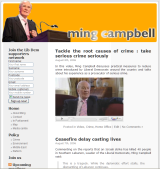Everyone agrees that there is a need to improve the working relationship between all the Lib Dem Parliamentary Parties. We need to communicate better between London, Brussels, Strasbourg, Edinburgh and Cardiff. But the most pressing need for improvement is in the relationship between the Westminster and European Parliamentary parties. This is especially true after the difficult debate at our last Federal Party Conference in Blackpool.
Some useful steps have already been taken. Immediately after the Blackpool conference, I asked Nick Clegg MP, our European Affairs Spokesman in the House of Commons, to work with each of the party’s departmental “teams” of MPs to develop more effective working relationships with their opposite numbers in the European Parliament.
Discussions have been held with Graham Watson, leader of the ALDE Group, and Chris Davies, leader of the UK Lib Dem group, on how matters could be improved further in the future. In supporting me in my leadership bid, Graham, Chris, Andrew Duff, Emma Nicholson and others have stressed that they want me to continue to make further efforts in this direction if I am elected as leader, something I wholeheartedly welcome.
What strikes me as particularly important is that there should be greater coordination between the two Parliamentary parties on legislative issues. Legislation dealt with by our MEPs often does not cross the desks of MPs until several months, sometimes years, later. We could do much more to ensure that the work of our MEPs is not only fully discussed with their counterparts in Westminster, but is also used proactively by MPs as “advance warning” on the position taken by Government Ministers in EU negotiations. That way our MPs could use the information provided by MEPs to press Government Ministers at an early stage in the decision making process, before it is presented to the House of Commons as a done deal.
Finally, as Leader I will urge our MPs and MEPs to campaign jointly more on a range of issues. The scandalous secrecy of the Council of Ministers is a classic example where reform is urgently needed in the EU, and that reform can be most effectively promoted through a joint effort on both sides of the Channel. Campaigns can also work well at ground level when MEPs and MPs, where their constituencies overlap, work together on local or regional issues. There are some good examples where our MEPs and MPs have worked well together at constituency level, and I will seek to promote such cooperation further in the future.



